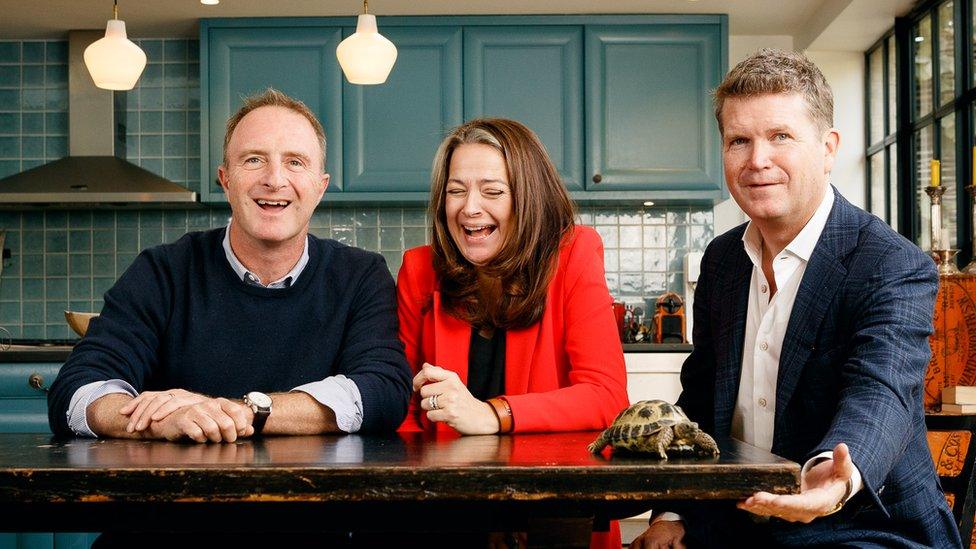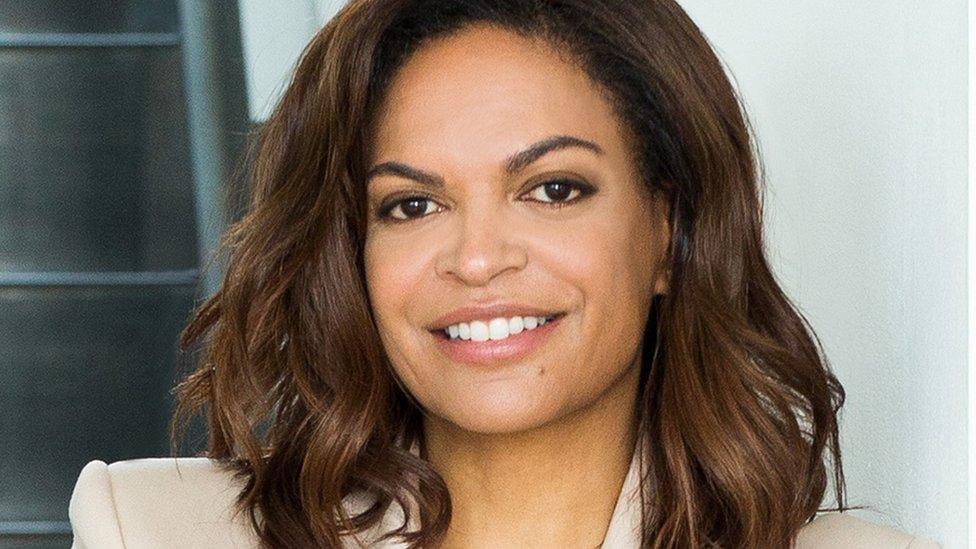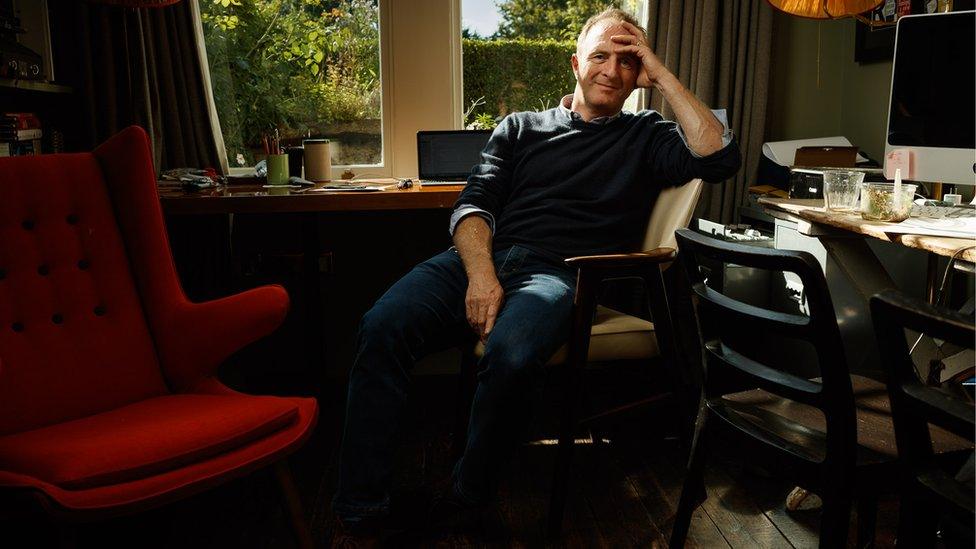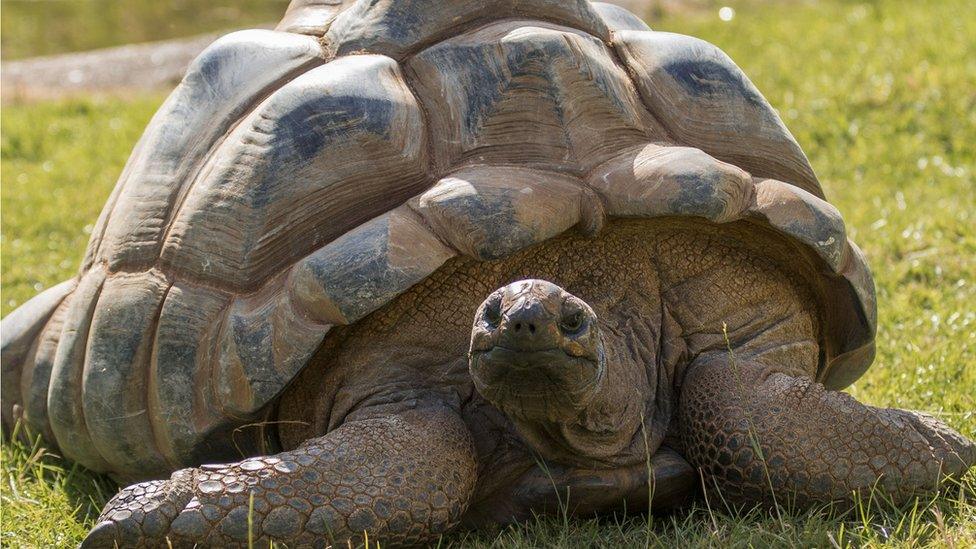Can Harding make Slow News pay?
- Published

Tortoise founders: Editor James Harding, publisher Katie Vanneck-Smith and chairman Matthew Barzun, the former US Ambassador to Britain (with Agatha the tortoise)
James Harding's Tortoise Media, external will launch in January after securing initial backing for three years from a group of eight private investors.
The former director of news and current affairs at the BBC, who this week signed Chris Cook, policy editor of Newsnight, is making a pitch for consumers who feel overwhelmed by digital news and are willing to pay subscriptions for curation and expertise.
Canadian businessman David Thomson, whose family gave its name to Thomson Reuters, is the lead investor. He joins: Saul Klein, co-founder of venture capital firm Local Globe; Merrill Lynch's EMEA boss Bernard Mensah and his wife Genevieve, investing in a personal capacity; and former US Ambassador to the UK Matthew Barzun and his wife Brooke.
Barzun is also co-founder and chair of Tortoise Media. Buzzfeed's Mark di Stefano was first to report, external the American's involvement.
The names of other investors - one individual, and one couple - cannot be disclosed for now. The independent director will be investor and entrepreneur Ceci Kurzman.

Investor and entrepreneur Ceci Kurzman will be the independent director of Tortoise Media
Together these private investors, who own similar amounts to each other, will be minority shareholders. The majority owners are co-founders Harding and Katie Vanneck-Smith, the former President of Dow Jones (who is publisher), together with the Barzuns.
The Barzuns have a dual contribution, both as part of the minority shareholder group, and as equity partners with Harding and Vanneck-Smith in the remainder of the company. All partners in Tortoise Media will also have shares.
Over a long discussion in his new venture's temporary offices, in Dallington Street in London's Clerkenwell area, Harding explained the origins and ambition of Tortoise Media. This blog will answer two questions: first, what is it editorially? And second, will it work commercially?
Naturally the first answer will be longer, given the venture hasn't yet started.
Full disclosure: Harding hired me at the BBC.
Too much information
Harding says that in the second half of his tenure at the BBC, he began to strongly "identify with people who felt overwhelmed" by the news agenda.
In a period that saw two general elections, the Brexit referendum and the election of Donald Trump, the dominant characteristic of news in the age of social media is its speed and volume, he argues. As such, consumers feel overloaded, and powerless.
With the motto "Slow Down, Wise Up", Tortoise Media will offer three products. These are also explained in detail on a Kickstarter page it has set up.
First, a Daily Edition on smartphones, effectively a slow news feed, at 11am in London (6am New York), with five key pieces, breaking down the most important issues of the day, as selected by Harding's team. These will be a combination of text and video, with a heavy emphasis on the context to stories, some investigation and narrative.
Second, a daily editorial conference, from 6pm to 7.40pm, which will be called a ThinkIn. Tortoise has been running several of these in recent months.
As his former BBC colleagues can attest, Harding has a beef with many panel and debate formats, thinking they too often lack context and are structured around a false opposition or antagonism, which creates more heat than light.
They will be open to members to attend in person, and be the equivalent of an evening leader conference in a newspaper. Those who go will be encouraged to give a strong point of view, rather than merely ask questions; each event will be open for international members to ring into; and an edited video of each meeting will be sent to members the following day.
The ambition for each ThinkIn is to combine four different journalistic elements: written journalism, in the form of a 25-page booklet that should be digestible in around fifteen minutes, and will be distributed before the event; lively debate; strong opinion, in the form of a take by the Tortoise team; and ideally a lead, or the sniff of a future story.
The third element will be a quarterly print magazine, which is sent by post to members, and in effect a small book of big reads.
All of this output will focus on five broad areas; five giants, if you like: Technology, Finance, Natural Resources, Identity and Longevity. This indicates an answer to the first editorial question the venture faces: how to distinguish Tortoise from the current, vast offering available to consumers.
A love child
Slow News has been around for centuries: some people call it magazines; others, the 'Features' section. To take one example, The Economist has a periodical print offering, a daily digital offering, and an events business. How is Tortoise Media any different?
Harding says The Economist is the "most successful news brand in the UK", and with well over a million loyal customers, isn't a bad place to begin. He says this venture resembles "the love-child of TED Talks and The Economist."

Harding, seen here in his tortoise nest, believes in arranging news around five big themes which point to how the world is changing.
The open editorial conference of Tortoise is one point of difference. Harding says his team's ultimate aim (again not completely new) is to create a "system of organised listening". What that means is making members feel they directly contribute to editorial positions. It resembles a decision by The Guardian a few years ago to publish its news list , externalonline.
Many news organisations are trying to enlarge their social media strategies, from mere social publishing to social listening, with techniques such as open source journalism. A daily editorial conference, open to members, gives this real-life form.
The Daily Edition won't, in the manner of the 'Espresso' service from The Economist, give a digest of all news. Instead, it will offer a take on five big stories, some of which news outlets may generally be neglecting.
The other major point of difference is editorial philosophy. Harding says Tortoise will be "non-party political", with "no proprietor" and no "subtle relationships with advertisers", because it will be entirely funded through membership.
Whereas a publication like The Economist was founded to promote liberalism, and a publication like the Financial Times has a financial worldview (the clue is in the name), Tortoise Media is "not an economic[s] [based] organisation. Our key idea is personal responsibility."
Harding argues that "two principles, liberty and fairness, guided every news organisation for much of the past century". He wants to shift from those to a focus on "dignity - the idea that everyone has a right to be recognised and respected."
(Anyone interested in this argument will enjoy Francis Fukuyama's Identity, external and David Runciman's How Democracy Ends, external - both excellent).
Despite not being aligned to any party, Tortoise Media will have a strong point of view, for instance on Brexit. Harding insists this point of view won't simply be his own, and will evolve based on contributions. He cites a recent debate held by the company on crypto-currencies as illustrative. He entered the debate thinking there may be a case for banning them; by the end, the consensus was they are an asset which should be taxed like any other. His own view had changed.
Some of this editorial philosophy, such as not aligning with any party or faction, is familiar; other bits, such as the emphasis on dignity and personal responsibility, somewhat less so.
What of the argument that Tortoise Media will feed the so-called filter bubble effect? Isn't it possible it merely encourages like-minded souls to talk to each other, rather than confront heterodox views?
Anticipating this, Tortoise Media has "earmarked a percentage of revenues" to take the ThinkIn on the road, including to prisons, schools and clubs. The long-term aim is to conduct ThinkIns all around the world.
Staffing the beast
There are around 20 staff at the moment, rising to over 40 in the middle of next year. Senior figures include Ceri Thomas, former Editor of Radio 4's Today, and Keith Blackmore, who moved with Harding from The Times to the BBC.
The signing of Chris Cook, a former Financial Times journalist who received a glowing reference, external from his editor at Newsnight yesterday, is a declaration of wonkish intent.
So too is the signing of Giles Whittell, Chief Leader Writer of The Times, author and critic Catherine Nixey, and Jon Hill, who was Creative Director at the Telegraph. As Press Gazette reported, Tortoise has already signed Merope Mills, external from The Guardian.
Amusingly, in 2005 Whittell had cause to write a story about a tortoise, external in The Times.
Paul Caruana, the son of murdered Maltese journalist and anti-corruption activist Daphne Caruana-Galizia, is in charge of data analysis and social affairs.
Emma Sullivan, former head of events for Chatham House who then ran Barzun's outreach programme across the UK, has also joined the venture, as partner for programming and partnerships.
And Alexandra Mousavizadeh, a Danish economist who worked at ratings agency Moody's and the Legatum Institute before running the Prosperity Index, will be head of indexes.
The plan for Tortoise is that 10 editors will get a budget to bring in contributors (freelancers take note), and that a staff team of researchers, reporters and multi-platform producers will do much of the original journalism.
This team will do any investigative work. Tortoise has disavowed breaking news - a luxury many journalists crave - but will nevertheless aim to break news, through old-fashioned scoops that are followed up elsewhere.
A daily editorial conference for staff will be held at 11am after the Daily Edition is published.
The business model
A relatively small staff, and a limited print run, will help to keep a lid on initial costs. Distribution costs are low in the digital age, though posting the quarterly magazine could become expensive, depending on the location of members.
By the end of November, Tortoise will relocate to a space in Eastcastle Street in central London, "just round the corner from Facebook", as one staff member put it. And also six minutes' walk from Harding's old BBC office, in case he feels nostalgic. Tortoise Media's new space will double up as newsroom and studio.
The business model is all about membership. Once you realise you're a "high-quality, low volume" business, says Harding, "you can't do ads, because [advertisers] want high volume."
"I didn't want to do native content, because I'm sceptical if people actually read it or watch it," he adds, "and I don't want to be an ad agency."
While relying on advertising always risks compromising editorial values and being at the whim of social media companies, whether or not native advertising (basically advertising that matches the look and function of the editorial it sits next to) is effective, is certainly debatable. Billions are spent every year on native ads, by brands who seem to think they work. And some publishers are staking their futures on it.
Vanneck-Smith, who has moved back from New York for this job, has a pedigree in driving subscriptions at The Wall Street Journal. The flexible price points - from £1 a day for full members, to £1 a week for some large groups, and £1 a month for students and those in partner organisations - are designed to appeal to a broad demographic, and particularly young people.
Driving membership - which is to say, doing what magazines such as Private Eye do in trying to create a feeling that subscribers belong to a club - will be the dominant source of income in future.
The other side of it will be commercial partnerships with big institutions, for whom Tortoise will organise on-site ThinkIns - much like the TED Talks model. The aim is to strike up 8 to 10 such partnerships with industry leaders.
These companies will generally care about advocacy and purchase such sessions as a benefit to staff. Tortoise won't disclose who these partnerships are with yet, but two are signed up, two more are in initial talks, and six more are in more advanced talks.
While a broad base of loyal members is a safer long-term bet than corporate partnerships, which as discretionary expenditure can disappear on a whim, I suspect that the hefty lumps that come from these companies will be a crucial source of revenue in the early stages.
But who will pay for it?
So much for the vision. Does anybody actually want this stuff badly enough to pay for it? Is this a viable commercial proposition, rather than the loud scratching of a clever news man's itch?
On these crucial questions, of course nobody has a clue - least of all Harding.
When looking at a start-up, investors inevitably ask questions on two areas: the people and the plan.
Is the leadership up to it? Who else has invested?
Harding was appointed Editor of The Times at 37 after many years at the Financial Times, including in China and America. His editorship of The Times ended after his relationship with Rupert Murdoch became untenable, external, but not before he led the paper through coverage of phone-hacking and the Leveson Inquiry.
The investors he has pulled together cover a range of industries and interests, and will take consolation from each others' involvement.
As for the plan, is there a gap in the market? And a market in the gap?
It is common sense, and wholly unoriginal, to observe that many news consumers feel bombarded, in age of overload. Moreover, Slow News is just a relatively new name for an old notion.
(Note this 2016 speech, external by former BBC Director Helen Boaden, my own Bob Friend Memorial Lecture this year, 'The Tortoise and the Share', and the existence of The Slow Journalism Company, external).
It is also clear that there is big global demand for English-language journalism that takes a step back and surveys the big picture. And that live events can draw big, loyal crowds: witness Intelligence Squared, 5x15 Stories, and of course TED.
But all this suggests that, rather than there being a gap in the market, there might just be a market - or rather markets, in Slow News and live events - which are big enough to accommodate a new entrant.
To own some of this turf, Tortoise will have to be different enough and good enough to justify its price. That is the huge unknown here: the quality of the product.
Given the demands on our attention today, and the exceptional quality of journalism available online - whether specialist or general, free or not - the competition is ferocious.
Will the quality of analysis in the Daily Edition be worth £1 a day (for members who don't get a discount)? Will the quality of experience at ThinkIns justify missing University Challenge or the nursery pick-up?
Winning the race
Harding met Matthew Barzun during the latter's time in Winfield House, the residence of the US Ambassador. Barzun, who now lives back in Louisville, Kentucky, was instrumental in suggesting potential backers.

Slow and steady won the race in Aesop's fable. But does the moral of that tale really apply to journalism?
Harding owns a tortoise called Agatha, and was attracted to the moral of Aesop's fable. He has leant heavily on the advice of Saul Klein, who suggested a roadmap for his first few months over a breakfast in London's King's Cross.
Despite his connections in the world of finance (he regularly attended Davos, for instance) raising money for a start-up, and running a business, is an unnatural experience for many journalists.
At 49, Harding has other big jobs in him if Tortoise goes wrong. That possibility was brought home to him by one tech mogul in particular. Harding gave him the hard sell in the investor's West Coast lair. The would-be backer responded by suggesting Harding find the crocodile pond at Whipsnade zoo, and jump in it.
The key point about tortoises, as Harding tells it, is not that they are slow - it's the fact that they win. In starting his own company, in a crowded field, he is certainly sticking his neck out.
James Harding will appear on Radio 4's The Media Show on Wednesday 17 October, at 16:30 BST.
If you're interested in issues such as these, you can follow me on Twitter, external or Facebook, external; and subscribe to The Media Show podcast from Radio 4.
- Published10 October 2017